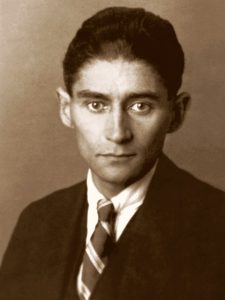Main idea: teshuvah is a dual process, looking inward and outward; getting rid of the things we detest
Franz Kafka has a two-sentence short story. It goes like this:
 “One day, a leopard stalked into the synagogue, roaring and lashing its tail. Three weeks later, it had become part of the liturgy.” The story tells the tragic tale – the lashing, roaring tale – of all organized religion, not just Judaism. It is the tale of how we cage revelation into a recitation, and think we have done our job, that we are religious people. Even when we practice we do it by rote, taking our heart out of it. The leopard is locked into the cage of liturgy.
“One day, a leopard stalked into the synagogue, roaring and lashing its tail. Three weeks later, it had become part of the liturgy.” The story tells the tragic tale – the lashing, roaring tale – of all organized religion, not just Judaism. It is the tale of how we cage revelation into a recitation, and think we have done our job, that we are religious people. Even when we practice we do it by rote, taking our heart out of it. The leopard is locked into the cage of liturgy.
I say this to prepare ourselves. In a moment, Isaiah will be speaking moved by God’s command: raise your voice like a shofar, shout the transgression of My people and their sin!
Isaiah’s words are the leopard.
And Isaiah has crashed into our fast, at this very moment in our fast, when our stomachs actually growl with hunger and our mouths begin feeling dry, when we feel faint and have headaches of caffeine withdraw, Isaiah tells us that focusing on our hunger, our thirst and our headache is completely and absolutely missing the point.
Who are we kidding, asks Isaiah, by pretending that we are a nation that does what is right, by pretending we have not abandoned the ways of justice, given by God? That we should stand here, at this moment, and say to God: look at me! I’m fasting!
Isaiah wants to move us from our self-absorption. He sounds outraged, full of righteous indignation and sad, all at once.
Who are you kidding, the prophet asks! The fast that is desired is the fast of oppression, of greed, of indifference!
Isaiah continues: God will only answer us if we banish violence from our midst, expel the menacing hand and evil speech, give food to all hungry.
This is basic teshuvah, collectively and individually, spelled out by Isaiah, even though he does not use that word. Why should he? This is Yom Kippur, the day for teshuvah, return! Isaiah, walking into a Yom Kippur sneers at people “drooping their heads like bullrushes.” He demanded that they pay attention to the poor, to those in prison, and also to their own scrabbling for wealth.
Have we changed that much in 2,820 years?
Look at the prophet in the eyes: can you say we banished violence from our midst? Who are we kidding, we, who live in a country where every day, more than 100 people are killed with guns and 200 more are shot and wounded?
Look at the prophet in the eyes: can you say we banished evil speech from our midst? Who are we kidding, we, who live in a reality where from every screen and every speaker words demonizing others, falsehoods, lies come to meet us.
Look at the prophet in the eyes: can you say we have clothed the naked? That we fed the hungry? Who are we kidding, we, living in a country with 140 million poor and low-income people, with 38.5 million of them being children? A country in which 1.5 million public school students experienced homelessness this year alone?
Look at the prophet in the eyes: can you say we have unlocked the fetters of wickedness? Who are we kidding, we, living in a country with around 52,000 immigrants confined in jails, prisons, tents and other forms of detention – most of them for profit. 13,000 of those are children. We, who have the biggest incarcerated population in the world, around 2 million people.
Look at the prophet in the eyes: can you say we have broken the yoke of oppression? That we did not work on our holy days, and did not oppress our laborers? Who are we kidding, us, with stuff made by children in India and prisoners in China and in the US? Who are we kidding, us, living in a country where CEO compensation has grown 940% since 1978 whereas the typical worker compensation has risen only 12% during that time?
Teshuvah means return. This is not just a return of the religious type, mitzvot or good deeds, prayer or inspection of actions – but rather, it is supposed to be a return to the place we belong. The return to our home. That is why in the middle of a pandemic we are here, in a sanctuary, we crave to be back home, to feel that we are connected. The return to godliness is like the return to the foundation, to home base of who we really are. Because deep inside of you, of me, of every single human alive, there is a spark of God’s presence, begging, cajoling, nagging you to be better and to make this world better.
According to Rebbe Kalonymus Kalman Shapira, the Piaczeczna rebbe, who was murdered by the Nazis, all your thoughts of teshuvah, of return, of becoming better, of making this world a better place, all of those – that is actually the voice of that spark.
Because G!d’s voice is actively asking to be revealed in this world through you. You are the revelation of G!d, if you allow that to come out.
And he goes on: even your worries, money, job, children, grandchildren, politics, the state of public education, firearm regulation, democracy: all of it, all of it is G!d’s voice begging you to let G!d’s presence come out in this world. And this is precisely because every single one of us perceives that voice through our personality and our particular traits.
Now if you heard anything else from Isaiah, you heard that we are supposed to be a light to the nations. It is a beautiful image. But we have forgotten our call. We have been mired in distractions and accumulation of stuff, completely unaware of our mission to be a light to the nations.
We have separated ourselves from the rest of humanity, even from those whom we share a house with, and have been swallowed up by our screens, our iPods, iPhones, iPads, everything making us believe it is “I” that matters and no one else. Every single one of us walks in a darkness that we ourselves have made. We bought that darkness, that despair, that disconnect.
Teshuvah means return. A life without teshuvah is not really a life, because it is a unexamined life, a unchecked life, a life lived unawares, like the life of an ant on a paper boat in the sea at night, buffeted here and there by winds and waves with nothing to guide or to save. The ant is not even aware of its complete and utter helplessness, doesn’t even know of the lack of direction.
The first step of teshuvah is to decide not to be an ant on a paper boat in the sea at night. It is to decide to be intentional about where your life is going. To examine, check and be aware. Only then you will see the sea, and maybe find yourself in a boat with a helm.
Isaiah knows of evil people. The wicked, he tells us, never rest, like the stormy sea. Haven’t we seen that this very year? It has been hard to keep track of what is the latest cruelty perpetrated, the last corruption and the last power grab, because as soon as one happens, and we turn to try to digest it, we are confronted by three more. The wicked never rest.
But Isaiah has a promise: make those changes and you will be removing the obstacles in your road, in your road to return, to teshuvah.
Teshuvah means return. It is only when we live a life of meaning, a life that sees beyond its immediate desires, a life that is devoted to the community and to the larger American and human communities, that we will be able to see our light burst amid darkness. That is true to all of us, rachok vekarov, those close by and those far away.
When we see arrogance in the news, let’s not just yell but also vow to be more humble.
When we see violence, let’s not just point fingers but also address the causes that make people feel they have nothing to lose.
When we see bullying from politicians, let’s not just get mad but also pledge to be more compassionate.
When we see corruption, let’s not just shake our heads but also apply pressure to get corruption addressed, punished and curbed.
When we see blatant lies, let’s not just shrug our shoulders but also commit ourselves to living a life that honors truth, science, reality and numbers.
When we see greed, let’s not just scream but also locate the greed in us that needs to be addressed.
When we see racism, sexism, homophobia, xenophobia, hate, prejudice and bigotry, let’s not just protest but also work to uproot those evils within ourselves.
Because teshuvah is an inward-looking movement about ensuring we become the opposite of what we detest in the world, and also an outward-looking movement to uproot the evils we see in the world.
Heschel said: “Prayer is meaningless unless it is subversive, unless it seeks to overthrow and to ruin the pyramids of callousness, hatred, opportunism, falsehoods. The liturgical movement must become a revolutionary movement seeking to overthrow the forces that continue to destroy the promise, the hope, the vision.”
This year, look the prophet in the eyes, raise your hand and say “hineni” – here I am. Make your fast meaningful. Make your prayer meaningful. Do not let the end of the day and the recitation of the words tame your leopard. Make this year, through your actions, be a good year.
G’mar Chatimah Tovah, may we all be inscribed in a good year.

